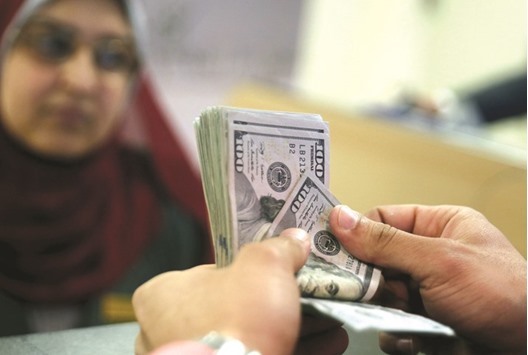In a world of negative rates and meagre returns, Egypt is finding beggars are still choosers when it comes to its bond market.
After devaluing the Egyptian pound and catapulting interest rates by the most in at least a decade, the average yield on 12-month Treasury bills sold in Cairo jumped 181 basis points and was at 13.9% at an auction last week. Yet they are still yielding the same or less than Brazilian or Zambian debt with a higher credit rating.
“We’re getting up to the territory where Egyptian yields start to get interesting, but we’re not there yet,” said Stephen Bailey-Smith, a strategist at Global Evolution Fonds in Denmark. He helps manage about $2.5bn invested in more than 60 emerging and frontier countries, including Egyptian Eurobonds. “We think yields have more room to increase.”
North Africa’s biggest economy is suffering from a shortage of dollars and is trying to bring back some of the $10bn that fled its Treasury bill market following the 2011 uprising that toppled president Hosni Mubarak. Since then, Egypt has lurched from crisis to crisis and now can’t even rely on its Gulf allies for money following the collapse in global energy prices.
“Egypt still looks far from clear to us,” said Hakim Azaiez, head of investment at Gulf Central Agency Asset Management in London. “We need to see social and political stability before looking at investment instruments and returns.”
The authorities in Cairo say their strategy to boost investment is working. Markets attracted $500mn of new money following the pound’s 10% devaluation in mid March, central bank governor Tarek Amer said in a television interview shortly after.
Amer said he expected inflows of at least $5bn over the coming four months and promised that more measures will be taken to entice funds. He didn’t elaborate.
Egypt also offers call options to hedge against currency risk, according to Amr Mostafa, head of treasury and capital markets at the National Bank of Egypt. He said there had been a “decent reception” for the product since it was introduced on March 14 and it allows repatriation of funds in dollars.
The average yield on 12-month bills translates into about 11% after tax, while the call option costs a premium of 5.25%, according to data published by Banque Misr.
“Where would you get a safe, guaranteed 5.5% return in the world? Are the returns in other countries fully hedged?” said Mostafa, who was in the UAE on March 24 for meetings with banks to market the bills.
Existing business and aid relations between Egypt and the Gulf may mean Gulf allies step in to buy the debt, according to Anita Yadav, head of fixed income research at the National Bank of Abu Dhabi in the UAE.
Even after yields rose, Egypt’s local currency debt is still less attractive than its dollar-denominated Eurobonds, Bailey-Smith said. Those securities due in 2020 and 2025 yielded 5.5% and 7.5%, respectively, yesterday in Cairo.
For Sergey Dergachev, who helps oversee about $13bn of assets at Union Investment Privatfonds in Frankfurt, the problems that plagued Egypt’s domestic debt market before the pound’s devaluation still mean other countries are more alluring.
Although officials “made a correct step, and yields are very attractive,” he said, “I do expect some pound weakness to come in the near future. It’s not like it was in mid-2000s when many foreigners liked the Egyptian T-Bill market.”

A customer counts his US dollar notes in a bank in Cairo. North Africa’s biggest economy is suffering from a shortage of dollars and is trying to bring back some of the $10bn that fled its Treasury bill market following the 2011 uprising.
